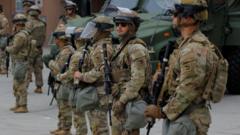Following escalating protests over immigration raids in Los Angeles, President Trump has authorized the deployment of National Guard troops, a move criticized by California officials as a precedent for authoritarianism.
President Trump Deploys National Guard Amidst Protests in Los Angeles

President Trump Deploys National Guard Amidst Protests in Los Angeles
Thousands of National Guard troops mobilized to confront immigration protests, raising concerns over the use of military on domestic soil.
In response to mounting protests against immigration raids, President Trump has mobilized approximately 4,000 National Guard troops and 700 Marines to Los Angeles, a controversial decision that blurs the lines of federal authority on domestic soil. The deployment has raised alarm among California officials, who are seeking an emergency court order to restrict the military's role to protecting federal properties.
Governor Gavin Newsom of California voiced his strong opposition, declaring that this action could symbolize a dangerous shift toward authoritarianism, stating, "California may be first, but it clearly won’t end here. Other states are next. Democracy is next." The governor’s comments reflect a concern that prolonged military presence could undermine democratic principles across the United States.
Supporters of Trump, including the President himself, argue that this intervention is necessary to restore order, with Trump claiming, "If we didn’t get involved, right now Los Angeles would be burning." However, military experts are cautioning against such deployments without clear justification, particularly as the protests in Los Angeles have been described as scattered and not significantly disrupting everyday life.
Helene Cooper, a Pentagon correspondent, explained that while National Guard troops are often called in to assist with natural disasters and civil unrest, these deployments typically require collaboration with state governors. Cooper suggested that the current protests do not meet the criteria for what could legally warrant the invocation of the Insurrection Act, which traditionally justifies military involvement in domestic law enforcement.
As tensions rise, Mayor Karen Bass has imposed a curfew in downtown Los Angeles. Across the nation, demonstrations continue to garner support, with many citizens alarmed at the potential implications of military force within U.S. borders. The unfolding situation highlights the complex relationship between state and federal authority in managing civil unrest.
Governor Gavin Newsom of California voiced his strong opposition, declaring that this action could symbolize a dangerous shift toward authoritarianism, stating, "California may be first, but it clearly won’t end here. Other states are next. Democracy is next." The governor’s comments reflect a concern that prolonged military presence could undermine democratic principles across the United States.
Supporters of Trump, including the President himself, argue that this intervention is necessary to restore order, with Trump claiming, "If we didn’t get involved, right now Los Angeles would be burning." However, military experts are cautioning against such deployments without clear justification, particularly as the protests in Los Angeles have been described as scattered and not significantly disrupting everyday life.
Helene Cooper, a Pentagon correspondent, explained that while National Guard troops are often called in to assist with natural disasters and civil unrest, these deployments typically require collaboration with state governors. Cooper suggested that the current protests do not meet the criteria for what could legally warrant the invocation of the Insurrection Act, which traditionally justifies military involvement in domestic law enforcement.
As tensions rise, Mayor Karen Bass has imposed a curfew in downtown Los Angeles. Across the nation, demonstrations continue to garner support, with many citizens alarmed at the potential implications of military force within U.S. borders. The unfolding situation highlights the complex relationship between state and federal authority in managing civil unrest.





















